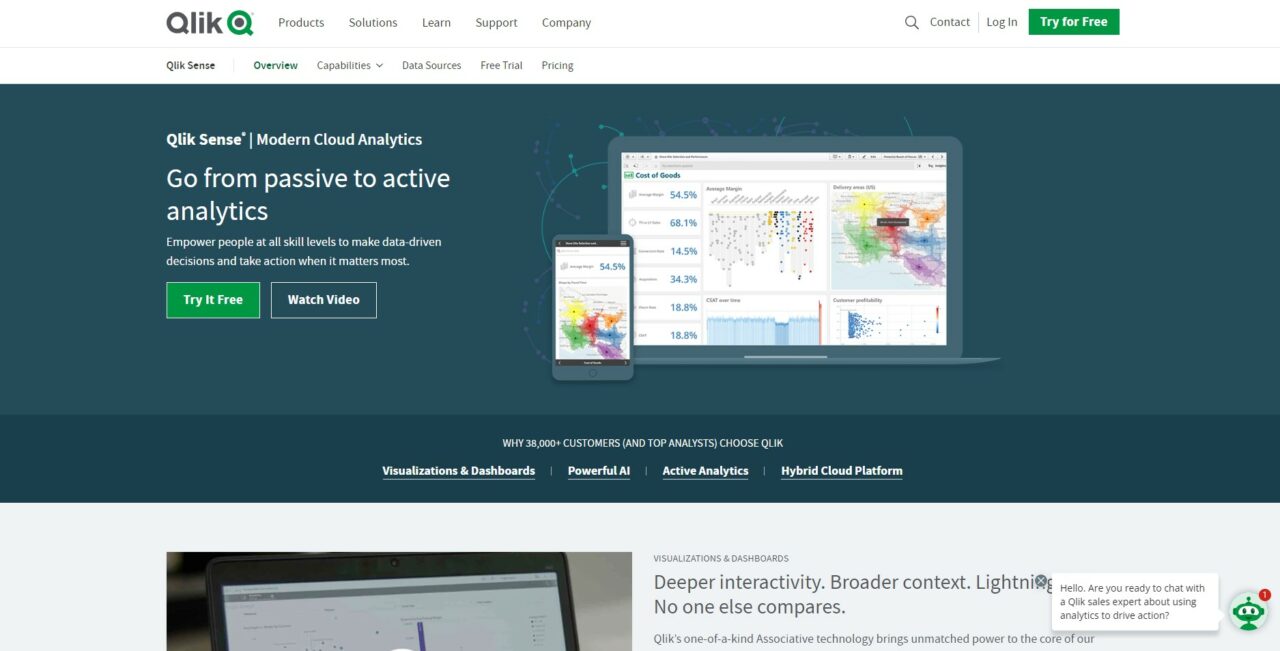A business intelligence analyst’s job is to sift a lot of information to put together reports on the patterns and trends in a market.
Accessing and evaluating data effectively requires a unique set of competencies, including technical know-how and business acumen.
To assist you in deciding on a career path, we’ve included an outline of the job’s duties, skills, and prospects below. Let’s read on to discover!
Job Description
An analyst in business intelligence gathers and analyzes relevant data and information to aid businesses in making informed choices.
What makes up a meaningful day for them is collecting data, processing it, and disseminating the results to the appropriate parties.
The duties of a business intelligence analyst are as follows:
- Accounting for, cleaning up, and evaluating a company’s financial data;
- Keeping it in an internal computer database at your organization;
- Recognizing trends or weak spots in the data that may indicate opportunities for growth in the company;
- Graphing and charting information, as well as writing and presenting reports to colleagues and customers;
- You will compile analytical reports summarizing your results using the company’s established communication channels.
- The ability to effectively communicate facts to various audiences via interactive presentations and written reports.
Where do BI Analysts work?
Business Intelligence Analysts are a common element of the IT and business development departments at companies of all sizes and sectors.
In addition, they exchange information and develop methods for dealing with threats in conjunction with a network of law enforcement and intelligence agencies on a local, national, and worldwide scale.
Education Requirements
Before joining the field, you should educate yourself as much as possible on data. So, before applying for the job, meet these criteria.
Degree and certificate

A four-year degree in computer science, business, mathematics, economics, statistics, management, accounting, or a closely related discipline is required.
A master’s in data science might be a good fit if you already have some professional experience but feel you need a more robust grounding in data.
Some companies may hire people with degrees in unrelated fields if they have taken courses in these topics and can demonstrate competency.
If you have worked in computer information systems, data modeling, systems analysis, or a similar area for at least two years, you may qualify for the CBIP exam.
Companies such as Facebook, Google, Microsoft, Amazon, and many more prioritize applicants who have earned certification from respected organizations in their field.
Online courses
You may gain data analysis or Power BI knowledge by completing a relevant professional course or certificate program.
Certificate programs and online classes provide a convenient way to gain understanding in a new area without having to unroot your life completely.
You might enroll in one of the following online courses listed below:
Business Intelligence Concepts, Tools, and Applications
This course introduces business intelligence technologies and how you can use them to aid in general corporate decision-making.
Decision support systems, business intelligence systems, and visual analytics all fall under this category of technologies, which have significantly affected company strategy, performance, and competitiveness.
Business Intelligence for Consultants Offered
This training will teach you the basics of business intelligence, including what it is, why it’s useful, and how to use it in your consulting practice to serve your customers better. Joshua Rischin, who teaches at the university, has worked as a consultant for 40 companies.
The Business Intelligence Analyst Course
Decipher many acronyms and abbreviations associated with machine learning, statistics, business intelligence, data mining, supervised learning, predictive analytics, reinforcement learning, unsupervised learning, and many more. Develop a firm grasp of statistical testing procedures.
Many of these tasks are now automated by modern software and computer languages. Learn the fundamentals of data science programming in this introductory course.
Recommended Books
Business Intelligence Guidebook
Sherman points out the gap between theoretical and practical BI integration and fills that gap with lucid descriptions of the field’s architecture and procedures.
Sherman’s manual walks readers through the process of data integration and analytics so that they may put BI to use in their organizations.
Business Intelligence For Dummies
This book is a primer for those who have never studied business intelligence. There is an introduction to ideas and terminology for those starting.
Not only does it explain how to build BI technically, but it also equips readers with the know-how to see patterns and use BI on their own.
Successful Business Intelligence
This book by Cindi Howson explains in depth how to implement BI in a company. She explores the effective methods currently being used by thriving businesses.
You’ll have no trouble getting started if you follow the tried-and-true examples and tutorials.
Essential Skills

Individuals interested in becoming business intelligence analysts will need a diverse skill set. The in-demand abilities for a business intelligence analyst are:
Hard Skills
- Data modeling
- Data warehouse
- Business intelligence
- Data mining
- Hadoop, SQL, Python, and C#
- Tableau and data visualization
- Business analysis
- Data analysis
- Business administration
- Database management and reporting
- Data mining and analytics
- Database design
- Data Architecture
- Data visualization
- Data security and privacy
- Proficient in ETL (extract, transform, load)
- Cloud computing and data storage technology
Soft Skills
- Microsoft Office
- Problem-solving and critical-thinking
- Superb verbal and presentation abilities necessary for making suggestions
- Strong aptitude for team leadership, innovation, and collaboration in the context of a data science endeavor
- Competence in functioning as a member of a culturally and linguistically varied, internationally focused, and customer-service-driven team
Essential Tools

Numerous business intelligence solutions are now readily accessible. The majority of people suggested these things.
1. Microsoft Power BI
This dynamic application allows for the rapid creation of reports and dashboards that can be synchronized with data sources (including Facebook, Oracle, etc).
In addition to offering features like end-to-end data encryption and real-time access monitoring, it also has artificial intelligence (AI) capabilities, Excel integration, and data connections.
2. Tableau
Regarding data visualization, Tableau has made a name for itself because of its intuitive interface, but the software can do much more than create eye-catching charts. Among the services they provide is real-time visual analytics, which employs a graphical user interface (GUI) that lets users drag and drop buttons to identify patterns in data rapidly.
3. Qlik Sense
From pre-built applications and dashboards to user-defined and integrated analytics, Qlik Sense can handle it all. It has an intuitive design that works well with touchscreens, cutting-edge AI, and robust cloud infrastructure.
4. Dundas BI
Users may analyze their data using Dundas BI thanks to its drag-and-drop interface. The tool’s user-friendliness and adaptability are primarily thanks to the interactive dashboards, reports, and visual analytics it provides.
5. Sisense
It can process data faster than other methods because of its in-chip technology.
One of the critical aspects is white-label analytics integration, which allows a business to tailor the service to its requirements.
Job Outlook
Forbes, an American business magazine, has named business intelligence analyst one of the hottest jobs in the STEM fields.
The position is in high demand across sectors, including the financial services, manufacturing, technology, healthcare, insurance, and e-commerce sectors.
Career Growth Opportunities
The BLS predicts a 14% growth in demand for management analysts between 2020 and 2030, leading to an additional 907,600 jobs in the sector.
Analyst professions, such as data analysis, are good entry points for those interested in becoming business intelligence analysts.
Consultants, architects, managers, and other high-ups in the business intelligence industry are all possible destinations for these individuals.
They are necessary for various professions, including medicine, teaching, finance, and law enforcement. Business intelligence analysts may help companies in these industries get an edge by analyzing large amounts of data.
In consequence, they are in great demand. You may set yourself apart in today’s fiercely competitive, abundantly hiring job market if you have the correct mix of education, experience, and enthusiasm for creative solutions to challenges.
Salary
In the United States, a business intelligence analyst can earn anywhere from $48,701 to $93,243 a year, with the median income at $66,645.
For instance, according to our report, a business intelligence analyst in New York City can expect to earn a median annual income of $92,800.
Cities in the Bay Area, such as San Francisco and San Jose, as well as Washington, Portland, Seattle, and Boston, are home to some of the highest-paid business intelligence analysts outside of New York City.
List of top companies hiring Business Intelligence Analysts
The following are some firms that have open openings for Business Intelligence Analysts right now:
Goldman Sachs
Goldman Sachs promotes diversity and inclusion within the company and the broader community. To this end, we provide our employees with a wide range of development opportunities.
Apple
You will liaison with business stakeholders and technical teams by doing strategic and tactical analytic work supporting Health initiatives.
SoundCloud
The core analytics team at SoundCloud is expanding, and they need a Junior Business Intelligence (BI) Analyst to help with data collection and analysis.
Our key performance indicator (KPI) reporting, dashboarding, and self-service analytics are all supported by this group, which acts as a hub for the rest of the firm.
Advantages and Disadvantages
There are many positive aspects to the job of an intelligence analyst, but there are also some negatives.
- Fast-paced environment
Analysts in the intelligence community often find their jobs stimulating and fast-paced due to the continual flow of new information.
- Engaging duties
An intelligence analyst’s job description often includes various interesting responsibilities related to multiple criminal activities.
You may monitor actual criminal behavior, stop organized crime, and delve into intriguing information about criminals and their psyches.
- Ability to help others
Analysts in this field work on client initiatives to improve government policy, safeguard against cybercrime, and strengthen national security.
- High compensation
Intelligence analysts may expect to earn a high salary since their job is crucial.
- Advancement opportunities
An intelligence analyst’s primary goal is to learn more about the world to make the world a safer place. Therefore, the skills and information they obtain during this work are generally transferable to higher-level roles.
- Collaborative workplace
You’ll get to work with a wide range of security, intelligence, data analysis, and national defense specialists if you choose to pursue a career as an intelligence analyst.
- Access to high-tech innovations
Intelligence analysts also employ cutting-edge software and complex algorithms to handle and evaluate data.

- Strict confidentiality
Because of the nature of their profession, many intelligence analysts cannot discuss their jobs with family and friends.
- High-pressure projects
Performing well under stress and pressure is crucial for every intelligence analyst.
FAQs
What are the requirements for a business intelligence analyst?
- A four-year degree in a relevant field, such as CS, IT, FIN, etc.
- SQL Server know-how: creating SQL objects, optimizing performance, analyzing data, and integrating it.
- Possessing technical expertise in areas like C#SharePoint, VSTO, Power BI, SAS, and the MEAN Stack.
Is being a business intelligence analyst hard?
A business intelligence analyst should be well-rounded in both technical and interpersonal abilities. Analysts in the field of business intelligence must possess strong analytical and problem-solving abilities and strong interpersonal and communication skills.
How much does a business intelligence analyst?
PayScale reports that the average annual income for a business intelligence analyst in the United States is $66,645, ranging from $48,701 to $93,243.
How long does it take to be a business intelligence analyst?
On average, you’ll need two or three years of work experience for entry-level positions or even eight years of experience for critical roles.
Is business intelligence a stressful job?
Being a business analyst certainly isn’t an easy profession. It is because they are responsible for analyzing massive volumes of data and making informed choices for their organization.
Is business intelligence well-paid?
According to PayScale, the average starting income for a business intelligence analyst is about $59,100 per year.
Does business intelligence need math?
To perform business analytics, you don’t need to be a computer programmer or a mathematician. Those who thrive on tackling challenging challenges and providing actionable insights based on company facts can succeed in this field.
Is business intelligence a good career path?
When analyzing data, data analysts emphasize integrating data sets to discover new patterns beneficial to the company or other stakeholders.
Business intelligence analysts excel at sifting through massive amounts of data to conclude. Data analysts excel at seeing trends that provide insight into potential outcomes.
Does business intelligence have a future?
Without as many restrictions on the availability of interfaces and the open flow of data, the future of business intelligence is likely to be considerably more automated and aggressively employed. BI’s future direction is part of a dynamic model crucial to modern enterprises’ development.
Career Advice
A bachelor’s degree in a relevant discipline, or further training, such as an online Bootcamp, may get entry-level employment.
You may take classes online to acquire a new language or brush up on your existing abilities. There are alternative ways to gain expertise quickly, such as boot camps and intense courses.
In addition, interviewers looking to fill a business intelligence role may ask candidates a combination of technical and behavioral questions.
Potential employers would want to know that you feel comfortable communicating, solving problems, and working in a team setting.
You may use networking events to learn about prospective companies and make casual introductions. If you put in the time to network, you can find out about job openings or connect with individuals who might be willing to hire you.
It’s also possible to get insight into the recruiting priorities of potential employers. Even more so than in a traditional interview, the feedback you hear when networking might be more direct and candid.
If you’re a business intelligence analyst working in an organization, you may find that connecting with other analysts might help you get more done.
Analysts often collaborate with new teams. Therefore it’s essential to build relationships beyond organizational boundaries.
